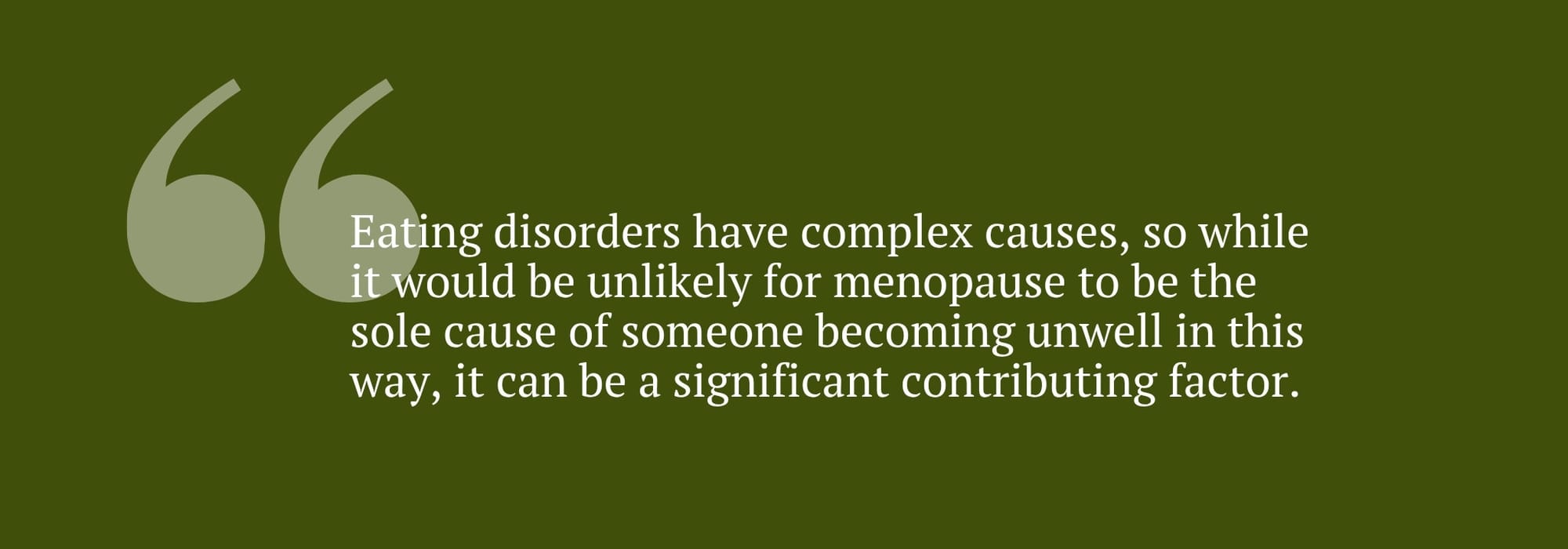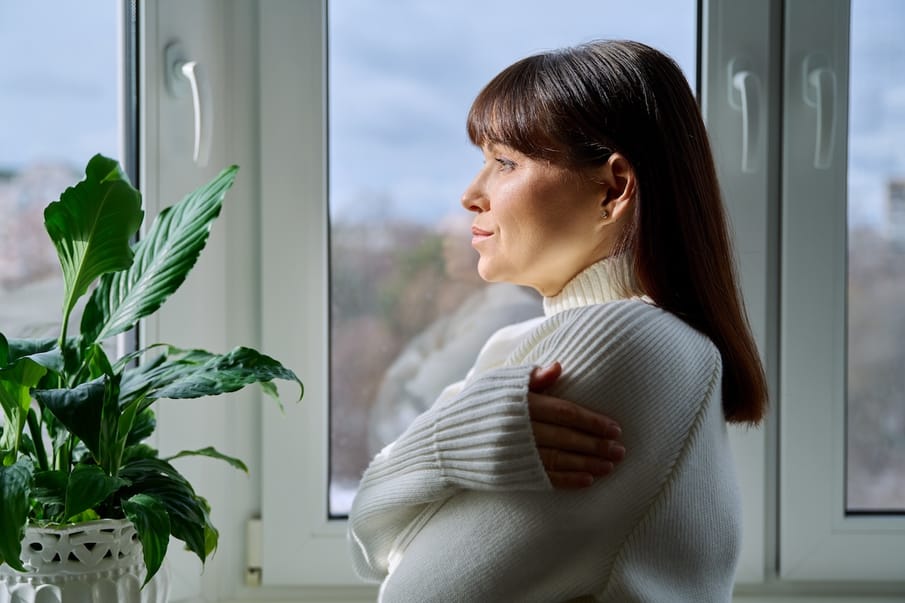At a time in life that impacts body image, eating behaviours, and coping mechanisms, a delicate yet complex link can be found between menopause and eating disorders – but why is this, and what can we do about it?
A huge life transition impacting reproduction, with fluctuating hormones affecting our minds and bodies – it’s a description that could apply to two monumental periods in life for those with menstrual cycles: puberty and menopause. Our bodies change, hormone levels dance chaotically, and emotions balance on a knife edge. Perhaps it’s not surprising that associations have been made with either the beginning of, or a resurgence in, eating disorders – stereotypically associated with teenage years – in later life, too.
For some, menopause brings a sense of ease, leaning into creativity and letting go of who we ‘should be’. For others, the mental health impact is significant – and this is something that shouldn’t be overlooked.
Going through changes
Naturally, as we age, hormone levels begin to fluctuate. For women, this can signify the end of their reproductive cycle, with menopause being when ovaries stop producing eggs, officially hitting this point after 12 months without a period. The time leading up to this (varying from months to years), when symptoms might display but some periods continue, is called perimenopause. Symptoms can be varied, ranging from more physical (e.g. muscle and joint pain; painful gums; dry and itchy skin; changes to body shape and weight; changes to period; hot flushes) to mental (brain fog; sleep difficulties; increased anxiety; mood swings; low self-esteem; changes in sex drive).
“Menopause involves a dramatic change in women’s sex hormones, especially oestrogen and progesterone, which have far-reaching effects, not just on the body, but also on brain chemistry,” says psychotherapist Lindsay George. “Oestrogen affects neurotransmitters like serotonin, dopamine, and norepinephrine, all of which are critical to mood, motivation, and emotional wellbeing.”
The connection between menopause and eating disorders
As with many women’s health issues, the link between menopause and eating disorders needs further research. However, a 2024 academic review, in Applied Physiology Nutrition and Metabolism, found “strong positive associations with disordered eating”, and a 2016 study in Maturitas noted changes in oestrogen levels during perimenopause could be linked to an increased risk of eating disorders.
As a 2024 study in the journal Menopause flags, approximately 3.5% experience eating disorders in ‘midlife’, and the prevalence of specific symptoms at this age can be as high as 29%. However, Umairah Malik, clinical manager at Beat (the UK’s eating disorder charity), notes: “Eating disorders have complex causes, so while it would be unlikely for menopause to be the sole cause of someone becoming unwell in this way, it can be a significant contributing factor.”

Umairah points to the hormonal and physical changes that take place. “As a result, dangerous coping mechanisms, such as disordered eating, can develop to feel ‘more in control’ over the changes occurring, or to manage difficult emotions.
“Feelings of perfectionism or low self-esteem can also impact women in their midlife, especially if they are dealing with big lifestyle changes at the same time, such as children leaving home, or caring for older relatives.”
Another contributing factor to consider is the slowing down of our metabolism, which can change body shape and weight. “These changes can be difficult to process, and can mean that women don’t feel like their usual selves, or may feel under pressure to lose weight,” Umairah highlights.
Psychotherapist Lindsay concurs, and explains that this can be especially difficult if someone has had a challenging relationship with food in the past. “If someone has a history of disordered eating or body image struggles, these changes can trigger a relapse as an individual may attempt to regain some control over their weight gain and changing body image.” It’s the combination of changing bodies, along with fluctuating hormones, that causes a sense of instability. It seems, dizzy with change and searching for solid ground, some may lean on unhealthy coping mechanisms, such as eating disorders.
Unique challenges at this stage of life
When dealing with an eating disorder during menopause, there are some particular challenges to keep in mind. A few that Lindsay highlights include:
-
Bone health risks: Both menopause and eating disorders (especially those involving restriction or purging) independently increase the risk of osteoporosis. Together, they can compromise bone density.
-
Cognitive and emotional strain: Menopause is linked to mood swings, depression, anxiety, and sleep disturbances, which can overlap with, or worsen, the psychological symptoms of an eating disorder.
-
Medical complications overlap: Cardiovascular risk increases during menopause, and eating disorders can exacerbate issues like arrhythmia, electrolyte imbalances, and gastrointestinal problems, making medical monitoring more urgent and complicated.
We also can’t forget the social isolation and stigma that can appear at this time. “There can be additional stigma around having an eating disorder later in life, leading to shame or reluctance to seek help. This is compounded by the often under-discussed realities of menopause,” Lindsay says. But, it’s important to note, despite these challenges, support is available and recovery is possible at any stage of life.
Practical steps for coping
The first step is to recognise when a problem might be brewing. Umairah lists some signs to watch out for: “Eating disorders can develop gradually, and it can be hard to tell if symptoms or behaviours are cause for concern. In general, if you feel that your diet or exercise routine starts to take over your life, or if you spend a great deal of time thinking about your weight, it’s worth speaking to your GP – and certainly if you start to notice behaviours such as bingeing, purging, or over-exercising.”
When it comes to treating eating disorders during menopause, professional help and self-help strategies can work in harmony.

Professional support
Speaking to a healthcare professional is the first port of call. They can advise what steps to take, usually involving a combination of physical, psychological, and nutrition-based support. You can get help with hormonal changes (such as hormone replacement therapy) and any side-effects or symptoms, and may be recommended to work with a counsellor, alongside peer support groups, to help you cope emotionally and tackle the eating disorder itself. Beat has some support groups, as noted on its website, including ones open to all, as well as condition-specific (such as avoidant/restrictive food intake, anorexia, bulimia, and binge-eating).
Learning how to change your relationship with food can be key, utilising it as a tool to nourish instead of punish. A dietitian who has experience in eating disorders and menopause could be a real asset on this journey.
Self-help
While you get help, any steps you can take to steady yourself are welcome. This starts by stripping away any social isolation and shame you may be feeling by reaching out to loved ones, and sharing your experience.
Lindsay says that tracking symptoms and habits can be useful on this journey – so journaling may be a helpful tool – as well as evaluating current coping mechanisms and seeking healthier ones, “like hobbies, socialising, or relaxation techniques”. Our sense of identity can get lost during menopause, so any activities that bring you back to ‘you’ can make a big difference.
“Practising self-compassion and body acceptance helps, too,” Lindsay says. “Engage in activities that promote positive self-esteem, like mindfulness, yoga, or body-neutral affirmations, rather than harsh self-criticism.”
Understanding the magnitude of menopause is something, societally, we need to work on. Raising our awareness of this, and recognising our vulnerabilities, can help us speak up when we need help.
“While eating disorders are serious, they are treatable, and it’s completely possible to go on to live a full and happy life, with a healthy relationship with food again,” Umairah reminds us. “It is essential that you get help at the earliest opportunity, however, as it gives you the best possible chance of making a full recovery. You are not alone.”


Comments